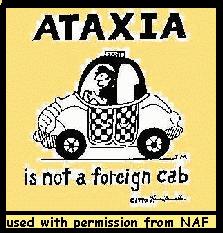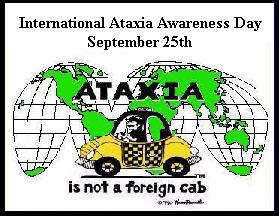 
of the Louisiana Chapter of the National Ataxia Foundation
to serve families in Louisiana affected by hereditary ataxia.
| |||
|
| Music playing is 'Jambalaya' |
| The Louisiana Chapter of the National Ataxia Foundation (NAF) is an extension of the NAF headquartered in Minnesota. As a part of the NAF, we are also dedicated to the following: | ||||
| ||||
| An estimated 150,000 people in the United States are affected by hereditary and sporadic ataxias, a group of neurological disorders which are chronic and progressive conditions affecting coordination. They strike without regard to age, gender, or race. |
|
What is ATAXIA? ATAXIA is a medical term used for incoordination, particularly in reference to walking. There are many different causes of ATAXIA, ranging from simple drunkenness to tumors of the brain to degenerative neurological disease. There are several groups of neurological diseases which tend to run in families. These disorders are collectively referred to as the HEREDITARY ATAXIAS which are classified by the specific areas of the brain and spinal cord that are affected. There are also sporadic forms of ATAXIA which have no known genetic linkage or family history. |
|
What causes HEREDITARY ATAXIA? The HEREDITARY ATAXIAS are genetic. The various abnormal genes that cause ATAXIA have in common that they make abnormal proteins that affect nerve cells, primarily in the cerebellum (and other parts of the brain) and the spinal cord. (The details are different for the different diseases.) Eventually the affected nerve cells begin to function poorly and ultimately to degenerate. As the disease progresses, muscles become less and less responsive to commands from the brain, causing coordination problems to become more pronounced. There are many genetic causes of HEREDITARY ATAXIA. Over 300 different genetic diseases or "syndromes" have been described that include ATAXIA as a symptom. |
|
What are common symptoms?
Symptoms and time (age) of onset vary according to the type of ATAXIA. Recessive disorders commonly cause symptoms to begin in childhood rather than adulthood (although for reasons that are not well understood, symptoms are not necessarily present at birth or infancy). Dominant ataxia often begins in the 20s or 30s or even later in life. Occasionally, individuals may not show symptoms of one of the dominant ataxias until they are in their 60s. Typically, balance and coordination are affected first. Incooridnation of hands, arms and legs and slurring of speech are other common symptoms. Walking becomes difficult and is characterized by walking with feet placed farther apart to compensate for poor balance. Impaired coordination of the hands and arms affects the person's ability to perform tasks requiring fine motor control such as writing and eating. Slow eye movements or limited range of eye movements can be seen in some forms of ataxia. As time goes on, ataxia can affect speech and swallowing. The HEREDITARY ATAXIAS are degenerative disorders that progress over a number of years. How severe the disability will become and whether the disease will lead to death depends on the type of ataxia, the age of onset of symptoms and other factors that are poorly understood. Respiratory complications can be fatal in a person who is bed-bound or who has severe swallowing problems. Some children with Friedreich's Ataxia develop serious cardiac complications. |
!*!*!*!*!*!*!*!*!*!*!*!*!*!*!*!*!*!*!*!*!*!   UPCOMING EVENTS
UPCOMING EVENTS!*!*!*!*!*!*!*!*!*!*!*!*!*!*!*!*!*!*!*!*!*! |
|
|
|
Please join us for a picnic and meeting of the Louisiana Chapter of the National Ataxia Foundation! Sunday, April 29, 2012 at 3 PM It will be held at Andrea Fantacci's new house The address is:2171 Rockybrook Drive Baton Rouge, LA 70816 Directions: From I-12, you would get off at the O'Neal exit and turn right onto S. Harrell's Ferry, then another right into the subdivision. Her cell is: 225-603-5050 if anyone gets lost If you haven't let me know if you can make it, please do so. If you would like to bring a dish, feel free, but there will be food provided. Contact Elizabeth Tannerfor more information and to RSVP (225) 241-3745 and/or email me -> louisiananaf@yahoo.com |
|
|
Click on the graphic below to send an e-mail to the LaNAF chapter's office for any additional information: louisiananaf@yahoo.com |
 Please take a moment and sign our guestbook below
Please take a moment and sign our guestbook below


Please bookmark  this page for future reference.
this page for future reference.
This site has been visited times since 1998.


Webmaster: Kim Bourg - FA'er